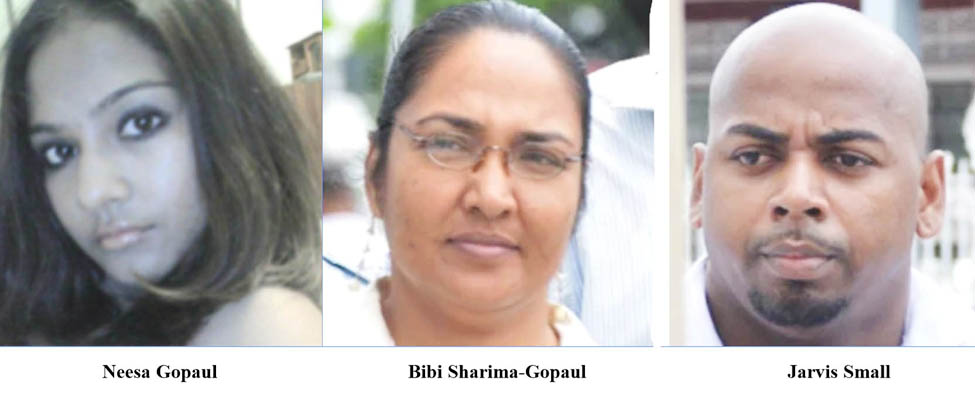Having heard all the arguments in the appeal filed by Bibi Sharima-Gopaul and her former partner Jarvis Small who were convicted for murdering Gopaul’s 16-year-old daughter Neesa, the Guyana Court of Appeal is now set to rule on a date to be announced.
Acting Chancellor, Justice Yonette Cummings-Edwards at the conclusion of final arguments yesterday morning said that the court will now consider the appeal and notices will be sent informing when its decision will be rendered.
Sharima-Gopaul and Small were both found guilty by a jury in 2015 for the gruesome murder of the former Queen’s College student, whose remains were found on October 2nd, 2010, stuffed in a suitcase which was discovered anchored by several dumbbells in a creek at the Emerald Tower resort.
Trial judge Navindra Singh had imposed a combined 202-year sentence on the convicts, with Sharima-Gopaul receiving 106 years in jail, and Small, 96, which both convicts have argued is unduly severe.
Lawyers for the appellants had previously argued that several irregularities may have led to the convictions.
When the matter was called yesterday, the Chamber of the Director of Public Prosecutions sought to solidify its arguments, maintaining its position that the case against the convicts, though circumstantial, remained strong.
To this end, Assistant Director of Public Prosecu-tions Stacy Goodings said that each circumstance, when looked at as a whole from the credible evidence of the prosecution witnesses, leads to only one rational concluding inference—that it was Sharima-Gopaul and Small who committed the murders and that the jury was right in so finding.
The state counsel then went on to outline that there was evidence that the dumbbells which anchored the teen’s body beneath the creek belonged to Small, a gym owner.
She said, too, that a bloody sheet was found to be one from a set belonging to Sharima-Gopaul’s home. The remainder of a length of rope which tied the dumbbells to the suitcase was also found at the home of Gopaul.
In addition, Goodings said that the suitcase in which Neesa’s body was found submerged, was the only one missing from a set bearing the same brand also found at the home of the convict Gopaul.
The Prosecutor sought to point out, too, that after Neesa’s killing, both convicts had been found by police together in the same hotel room where Small was found still counseling Sharima-Gopaul.
Pieced together
These, she said, were among a set of circumstances which when pieced together painted a clear picture of the convicts’ culpability.
The Chancellor grilled Goodings on whether the trial judge’s summation of the case to the jury was sufficient in dealing with the issue of the “inescapable conclusion,” of guilt which the prosecution contended the jury was right in arriving at from the circumstances.
Goodings said that Justice Singh in his summing-up would have emphasized to the jury that it can only convict having satisfied the standard of “reasonable doubt” and being satisfied based on the evidence led, that they were sure it was Small and Sharima-Gopaul who committed the crime.
She said, too, that the trial judge did point out to the jury that even if they did not believe the case for the defence, that they could not convict based on that, but that they would have to go back to the case for the state.
On this point she said the judge had explained clearly to the jury that the accused had nothing to prove or even disprove and that the burden of proof always rested with the prosecution.
The Chancellor then grilled Goodings on whither the trial judge had specifically dealt in his summation with how circumstantial evidence ought to have been treated with so that the jury knew that where there are two inferences, the one that favours the accused is the one to be drawn.
The Prosecutor said that in all the circumstances, the summation was adequate for the jury to have deliberated on a verdict.
The appeal is being heard virtually by the Chancellor and Justices of Appeal Rishi Persaud and Dawn Gregory.
On March 5th, 2015, Sharima-Gopaul and Small were both found guilty by a jury.
Lawyers for the convicts, however, subsequently filed appeals to the convictions and sentences arguing among other things, that Justice Singh committed several errors during the conduct of the trial, including the admittance of evidence that was prejudicial and failing to properly direct the jury.
Main prosecution witness Simone Diane De Nobrega, who was a former cellmate of Sharima-Gopaul, said Sharima-Gopaul had confided in her that it was Small who murdered her daughter by bashing her head in with a piece of wood.
De Nobrega had said that Sharima-Gopaul related to her that Small told her that they needed to get Neesa “out of the picture” and that he eventually killed the teen in her presence.
The witness had told the court that despite her assurance to Sharima-Gopaul, she would not have been able to live with herself if she had kept such a secret. She said as a mother herself of two sons, “I couldn’t carry such a weight.” The woman added, “Neesa deserved to get justice and no matter what, Neesa didn’t deserve to die by the hands of someone she trusted; someone that was supposed to protect her.”






